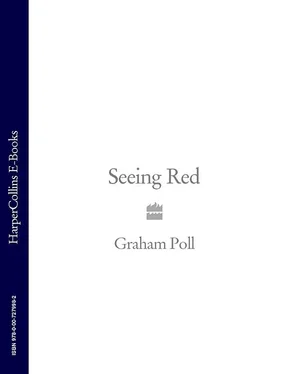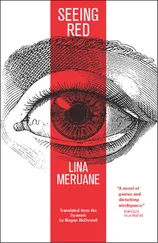1 ...8 9 10 12 13 14 ...18 Near the end, I was in one penalty area and the ball was heading for the other. I needed to get up the pitch. I had very little left physically, but I went for it. As I forced my tired limbs into a sprint, I pretended to whip myself, like a jockey urging on an old nag. In my earpiece I could hear both assistants and Mike Dean, the fourth official, laughing. Deano obviously thought I looked more like a train than a horse and I heard him telling me, ‘Put some more coal on, Pollie!’
I made it to the other end of the pitch, stood in the six-yard box to indicate a goal-kick and then immediately span and raced back to the halfway line. I glanced at the heart monitor on my wristwatch. It showed more than 100 per cent, which theoretically was not possible. It meant that I had got something extra out of my old system.
In the few moments remaining, I took several long looks around and stored the scene in my memory bank. It was a typical Spanish stadium, with big stands but no roofs. It was full. It was a tremendous occasion. I even managed to spot Julia in the packed stand. Magical. Memorable. When I whistled for full-time, I felt a rush of emotion. I could have ended my entire career at that moment and have been completely fulfilled.
The floodlights went off momentarily, which was interesting, but they came back on and we made our way off the pitch. The assistants and Deano hung back a bit, because they sensed this was a special moment for me and that I was emotional. But Christian Poulsen, Sevilla’s Danish international, gave me a hug and his shirt.
In domestic matches I just used an ordinary coin of the realm for the toss-up but in international matches I always used a special FIFA coin. My routine was that, after using it, I gave the FIFA coin to an assistant and he gave it to the fourth official for safe keeping. Then, at the end of the match, the fourth official always returned it to me – but not that night. In the dressing room after the game, Deano hugged me and started to return the coin. I said, ‘You keep it. It is yours. I won’t need it.’
That was how I told the officials that I was finishing at the end of that season. Deano said he had guessed, because of the intensity of my performance. He said, kindly, that nobody in Europe could referee better. I thanked the three guys for their help and support and stressed that it was not a moment of sadness for me: it was an occasion of celebration and achievement. I knew I had dredged up a performance which, in terms of fitness, decision-making, man management and concentration, belonged to the time, three or four years earlier, when I had been at my absolute peak. I knew that I would not be able to scale that peak again.
So the two teams – the team of officials and the team of family and friends – went for a meal and on to a tapas bar, which we left when they kicked us out at 4 am. UEFA rules prohibit family and friends from staying in the same hotel as the officials, but we had managed to find another (cheaper!) hotel very close by. So at 4.10 am I kissed Julia goodnight on the street. She went to her hotel and I went to mine.
I still did not want the night to end. Deano and the others came to my room and we talked about the game and about life until they gave up at 5 am. They left me with my thoughts and with the thirty or so cards from other English FIFA officials, past and present, which Deano had organized. The cards congratulated me on reaching 100 international matches. Those who sent them did not know that I was ‘declaring’ after reaching three figures, but their messages made a significant night even more unforgettable.
My next match, three days later, was a charity friendly: Tring Tornadoes Managers against Tring Tornadoes Under-16s. Attendance? About 350, or 44,650 fewer than in Seville.
Then, on Wednesday, 9 May 2007, I took charge of Chelsea against Manchester United. When I had been appointed for that fixture, it was expected that it would be the title decider. Chelsea, who had won the Premiership on each of the previous two seasons, trailed United for most of the 2006/07 campaign but hoped to leapfrog them to the top of the table in that crucial game at Stamford Bridge in May. It was expected to be an epic encounter, with the winner almost certainly taking the title.
Chelsea and Manchester United had also both won their FA Cup semi-finals, and had booked their places in the first Final at the rebuilt Wembley. That gave added significance to their League fixture, and for me to be awarded the appointment was confirmation that I was back at the top. I was number one again, which was important to me. The temptation to quit after Stuttgart had been very, very strong, but I did not want my career to end like that. I wanted to prove, to myself and to others, that I could recover, re-focus and referee consistently well. The Stamford Bridge showdown between the top two teams in the Premiership was an affirmation that I had succeeded.
It would be a big match for two of my children as well. Gemma wanders around the house in a Manchester United shirt and Harry is always wearing his Chelsea shirt with ‘Lampard 8’ on the back. Gemma has her drinks in a Man U mug; Harry drinks out of a Chelsea cup. Fortunately, there is nothing in the rules about children not supporting teams that their dad referees!
The match, however, was not the titanic encounter that had been expected. The weekend before the game at Stamford Bridge, Manchester United won at Manchester City and Chelsea drew at Arsenal. United were the champions. Gemma was delighted, but my match at Stamford Bridge was rendered meaningless. That did not mean it would be easy to referee – in fact, with both teams picking fringe players who were out to prove themselves, I sensed it could be quite challenging. And sadly, José Mourinho decided it would be me a night for me to remember, although not with fondness.
FIFA referee Peter Prendergast, my mate from Jamaica, flew over with his wife to spend a couple of days with us in Tring and come with us to Stamford Bridge, because he was in on my secret and knew it was going to be one of my last games. In the referee’s lounge before the game – a cramped little room, with a couple of sofas, in the dressing rooms area at Chelsea – we were having a cup of tea when John Terry walked past. He saw the door open, glanced in and smiled. I smiled back and so, after doing whatever he had to do, he came back and entered the room.
It was the John Terry I knew from a few years back: friendly, polite, jokey. It was nice for Prendy to meet the England captain, and I appreciated JT making the effort to shake everyone’s hand and have a little chat. Yet once the game kicked off, he was snarling and swearing at me at every opportunity. Once, when I started to have a bit of banter with Joe Cole, JT said to his team-mate, ‘F*** him off, Coley. Don’t talk to him.’
The first twenty minutes of the game were turgid. Nothing happened. But I kept my concentration because I knew one incident could change the nature of the match – and that one incident proved to be Alan Smith’s foul tackle on Chelsea’s John Obi Mikel. I should have given Smithy a talking to, so that the Chelsea player’s sense of grievance was salved and he had a moment or two to calm down. Instead, and wrongly, I let Chelsea take a quick free-kick and did not talk to Smith. So John Obi Mikel was still wound up and, within moments, he clattered into Chris Eagles with a bad foul.
Sir Alex Ferguson jumped up out of his seat, stomped up the line and started demanding that the Chelsea player should be sent off. What Sir Alex didn’t shout was that if I red-carded the young Nigerian, he would miss the Cup Final – but I knew. The challenge by John Obi Mikel was rash, but he kept low and did not really ‘endanger the safety’ of Fergie’s player. So I showed the Chelsea player a yellow card and not a red.
Читать дальше












